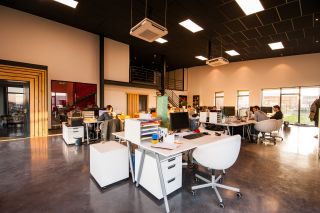Career
What Do We Need From Offices Today?
Hint: It isn’t just a place to work.
Posted May 25, 2023 Reviewed by Gary Drevitch
Key points
- Although working from home has surged, a large number of Americans are back in the office, fully or partly.
- Working from home is here to stay, but going into the office still offers many benefits.
- Some of the biggest supporters of the office are Gen Z-ers who seek mentorship and networking on site.

In the last few years our workplace conversations have focused primarily on the move away from offices. The sudden forced exodus during the pandemic gave way to a new widespread acceptance of fully remote and hybrid arrangements. But even though change dominated the conversation, the reality is that many people are working at least part of the time in employer-provided workspaces. (A recent McKinsey study put the number of full-time workers at 42 percent and found another 23 percent went to the office part of the time.) This doesn’t mean we will ever return to the 2019 levels of fully on-site work, but it does mean that a majority of people are motivated to be at the office, for at least some portion of the week. What will surprise some people is who wants to be in the office most of all. During the pandemic, more senior members of organizations – usually people over 50 – were most concerned about employees not being in the office. But now, reports state that the newest workers – Gen Z – are most inclined to look for opportunities to be in the office. And it’s not because they don’t have a physical space to work.
Why we need to work at the office reveals who is working there.
The hybrid work arrangement – which is becoming the new norm for many companies – is simply too novel a concept to have any standard version. Hybrid arrangements, in fact, might remain by definition a flexible concept, with different organizations creating different versions, and even variations among employees. This is partly because the concept of the hybrid workplace wasn’t just a shift from being unable to go into the office for health reasons. What we realized is that we no longer needed to go into the office for the reasons we did for the last hundred years or so. We didn’t need to meet in the same physical room because we could videoconference. We didn’t need corporate resources like printers or fax machines. Even the size of the personal computer shrank from a huge 90s style desktop to a laptop you can prop on a kitchen table. Technically no space was too small to work from. What we discovered instead were the emotional, psychological, and social benefits to being in the same space.
We probably do still need a shared workspace. But it won’t look the same for everyone.
Offices for new workers will probably be more about the professional development that is more organic when people are in the same physical space. As digital natives, they are unlikely to be craving offices because they don’t like Zoom or their Wi-Fi at home is too slow. My daughter, who is about to graduate from college, is a perfect example of this. When interviewed for summer internships this year, she declined one of the opportunities almost entirely because she couldn’t work at their office location. For her, attending college through the pandemic had already revealed the social limitations of being online exclusively. While she has no problem navigating a fully digital life, she recognized that she wanted the interaction and mentorship experience of an in-person work life.
3 things to think about when assessing if you need to go to the office:
- Can you do your job better at the office? For some people, an employer-provided workspace still provides some of the “old” benefits. If you live in a small home, if you have roommates, or you simply don’t like the idea of being at home all day, going to work might be better for you. Certainly, if your job requires studio space or special equipment, it might be easier to do tasks at your employer’s location.
- Being at work is more than going to work. Office spaces can offer the ability to network, provide mentorship, be mentored, shadow others, or have spontaneous conversations. If you need mentoring because you are early in your career, or you're a manager who wants to provide real-time feedback, think about how you might prioritize time in the office to achieve those goals.
- The psychology of the office. We are all social creatures. To be in a workspace is to be in a communal environment which affords opportunities to socialize more effectively. That includes everything from reading body language to building trust to navigating difficult conversations in person. We all need shared experiences, which increase our ability to empathize, and expand our perspectives. We never had to think about those benefits before, because going to work was a given. Now that it’s not, you need to consider how you will make up for those gaps if you aren’t going to the office at all.
Workplaces are not just a place to work, and they are still relevant.
Companies haven’t decided yet what hybrid looks like and how it functions. Because there are not (yet) many hard and fast rules, a lot of people will have the opportunity to help employers figure out what they need. What will be hardest but most important is thinking of why you need time in the office now. Some of it will be structure – the benefits of a commute that starts and ends your workday. But it isn’t as simple as productivity, as studies show that people can be equally or more productive performing tasks from home. Instead, consider all that a shared office space provides and which aspects benefit you.


